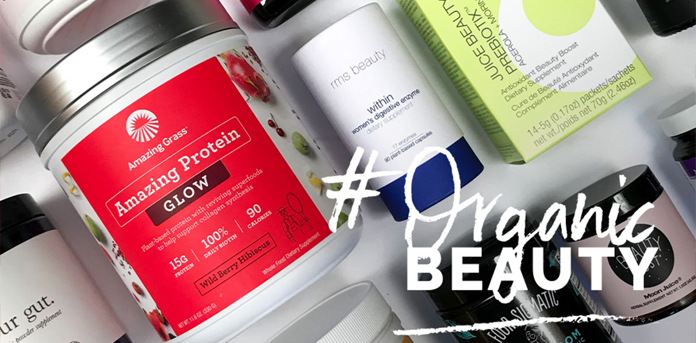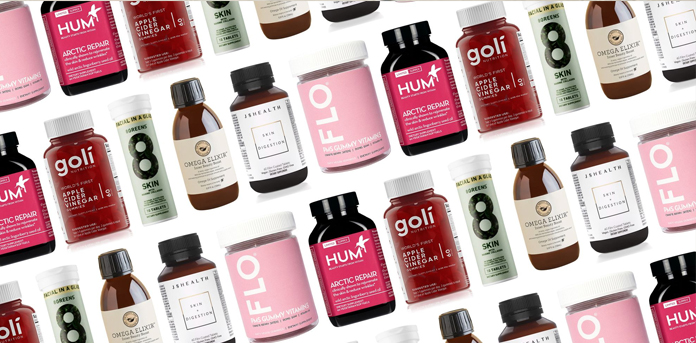Skin health is an important subject and has great interest and concern for those who want to maintain their overall appearance. Being the largest organ of our body, it serves as a protective layer against external elements. It is exposed to various challenges including pollution, UV radiation, aging, and lifestyle factors. As a result, there has been a growing demand for supplements as a potential way to support and improve skin health.
These days, the demand for dietary supplements to maintain healthier skin has gained popularity. There are many products claiming to offer a variety of benefits, from improving your skin texture and reducing wrinkles to relieving acne and other dermatological requirements. Such supplements usually contain a variety of vitamins, minerals, antioxidants, and other bioactive mixtures that are believed to improve skin function and appearance positively.
Popular Supplements For Skin Health

As the use of skin supplements has gained notable popularity as a potential means to support and improve skin health, it is essential to know which supplements are good for your skin. From collagen to biotin and omega-3 fatty acids, a great variety of supplements claim to manage various skin problems. Such supplements promise to reduce wrinkles, clear acne, and provide a glowing complexion.
Before incorporating them into our skincare routines, it is important to understand the scientific evidence behind their effectiveness. Let’s discover some of the major skin supplements:
Collagen
Collagen, the most important protein in the body, plays a key role in maintaining your skin texture and elasticity. As we age, our natural collagen production decreases which leads to sagging skin and the appearance of wrinkles. Collagen supplements have been widely used as a way to balance these effects and improve skin hydration. These supplements are available in diverse forms, such as bovine collagen, marine collagen, and plant-based collagen alternatives.
While some studies suggest that collagen supplements may lead to enhanced skin elasticity and moisture retention, more potent clinical trials are needed to conclusively prove their effectiveness.
Biotin
Biotin is also known as Vitamin B7 and it is vital for healthy skin, hair, and nails. It is involved in the metabolism of fatty acids and amino acids. These acids are important for maintaining skin elasticity. Biotin supplements are often known for stimulating clear skin and managing skin issues like acne and dermatitis.
While biotin deficiency can lead to skin problems, it is less clear whether supplementation has significant benefits for individuals with adequate biotin levels. Scientific evidence that supports the use of biotin supplements for skin health remains restricted and inconclusive.
Omega-3 Fatty Acids Supplements
Omega-3 fatty acids are vital fats that play a crucial role in supporting healthy skin barrier function and decreasing inflammation. These vital fats are found mainly in fish oil and certain plant sources like flaxseed, chia seeds, and algae. In short omega-3 supplements are considered to offer numerous benefits for skin health. They are also associated with addressing conditions like eczema and psoriasis and may also help reduce redness and irritation.
Some studies suggest that omega-3 supplements can improve your skin hydration and overall skin appearance. However, more study is required to better comprehend their specific results on different skin conditions.
Vitamin C Supplements
Vitamin C is also known as ascorbic acid. It is a powerful antioxidant that plays an essential role in collagen synthesis. It is also important for maintaining skin firmness and diminishing the signs of aging. Moreover, it helps safeguard the skin from oxidative pressure caused by environmental elements like UV radiation and pollution. Vitamin C supplements are often promoted for their capability to brighten the skin and improve hyperpigmentation.
While topical vitamin C has shown favorable results in these areas, the efficacy of oral vitamin C supplements for similar outcomes requires further investigation.
Vitamin E Supplements
Vitamin E is another effective antioxidant that helps protect the skin from free radical damage and supports skin repair processes. It is usually included in skin care products and supplements for its potential to enhance skin texture and decrease UV damage.
While some studies have indicated that topical vitamin E may be beneficial for certain skin conditions, the evidence supporting the use of oral vitamin E supplements for skin health is limited and requires additional research.
Zinc Supplements
Zinc is a necessary mineral for skin health. It is known for contributing to wound healing and overall skin health. It is typically found in topical ointments for curing acne, as it possesses anti-inflammatory properties and helps control oil production. Zinc supplements have also been analyzed for their potential to control acne and other skin conditions.
Some research indicates that zinc supplements, when used with other treatments, may be effective in reducing acne spots. Yet, the optimal dosage and long-term effects of zinc supplements on skin health are still under investigation.
Considerations And Precautions
- Before using any supplement for skin health, it is important to consult with a healthcare professional or a dermatologist.
- Remember that supplements should not be a replacement for a well-balanced diet. Focus on consuming nutrient-dense foods, like fruits, vegetables, whole grains, and lean proteins, to support overall health and skin health.
- Look for reputable brands and high-quality supplements to assure purity, potency, and safety. Always check for third-party testing and certifications.
- Inform your healthcare provider about all the supplements you are using to avoid any negative effects.
- Follow the advised dosage instructions provided on the supplement packaging or as recommended by a healthcare professional.
- Understand that individual responses to supplements may vary. Not everyone will experience the same benefits or effects.
Expert Opinions Regarding Skin Supplements
- Dr. Emily Thompson, a respected dermatologist, highlights that while some skin supplements may show promise in early studies, there is currently limited scientific proof to support their effectiveness. She advises her patients to focus on a balanced diet, proper skincare, and sun protection as the foundation of good skin health.
- Dr. Michael Chen, a nutritionist with vast expertise in skin health, highlights the importance of a holistic approach to skincare. He suggests incorporating nutrient-rich foods into the diet and cautions against depending solely on supplements for skin improvement.
- Dr. Sarah Adams, a renowned dermatologist, believes that some supplements may have potential benefits for skin health. However, she suggests that topical application of certain vitamins and antioxidants could be more effective than oral supplements for targeted skin improvement.
Studies Related To Skin Supplements
This study aimed to examine the results of collagen peptide supplementation on skin elasticity and hydration in postmenopausal women. The study indicates that collagen peptide supplementation may have positive effects on skin elasticity in postmenopausal women.
This controlled trial aimed to evaluate the effectiveness of omega-3 fatty acid supplements in relieving eczema severity in pediatric patients. This study indicates that omega-3 fatty acid supplementation may be effective in improving eczema severity in pediatric patients.
FAQs
Are skin supplements safe to use?
The safety of supplements can vary depending on the type of supplement and skin condition. Usually, when used as directed and from reputable sources, many skin supplements are considered safe for the average person. However, it is important to be cautious about potential interactions with medications and other supplements.
Can skin supplements replace a proper skincare routine?
Skin supplements should not be used as a substitute for a proper skincare routine. While some supplements may offer benefits for skin health, they are most useful when used with a complete skincare routine.
Which skin supplements are best for aging skin?
Some skin supplements are generally associated with aging skin support. Collagen supplements are considered to help improve skin elasticity and reduce the appearance of fine lines and wrinkles. Vitamin C and vitamin E supplements are potent antioxidants that can protect the skin from oxidative stress and contribute to a more youthful appearance.

